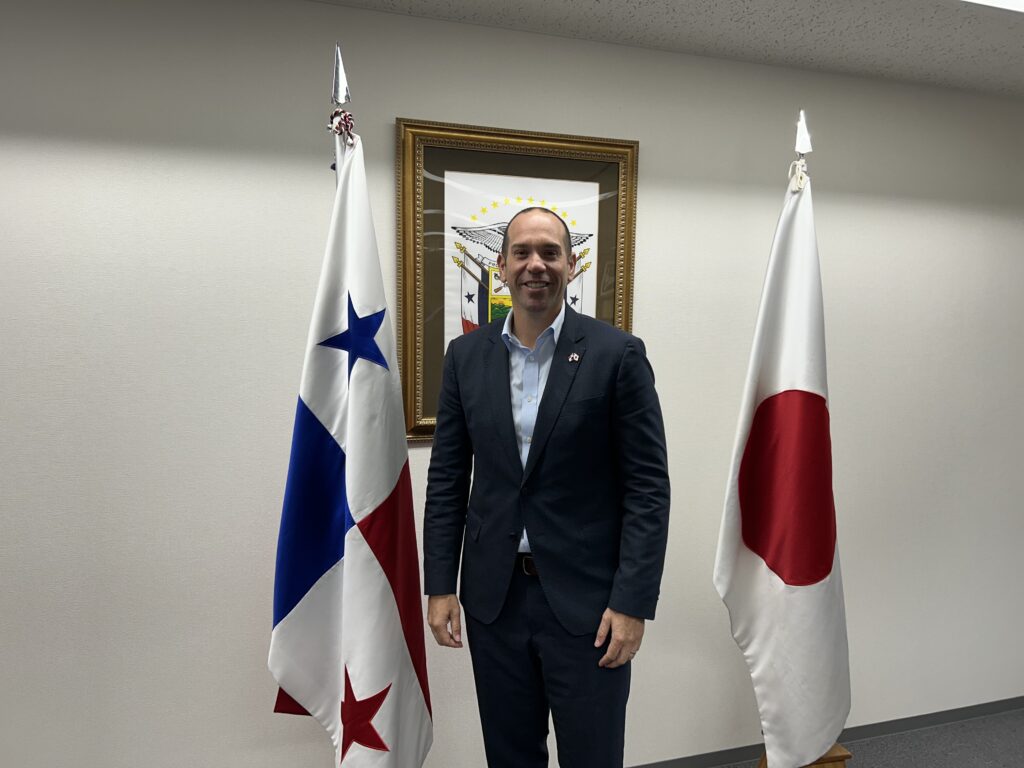
This year marks the 120th anniversary of the establishment of diplomatic relations between Japan and the Republic of Panama. The Republic of Panama is a critical maritime nexus connecting the Atlantic Ocean (Gulf of Mexico) and the Pacific Ocean through the Panama Canal. In the fiscal year 2022, cargo passing through the Panama Canal that originated from or was destined for Japan accounted for 13.3% of the total cargo volume. This ranks Japan as the third largest in terms of cargo volume through the canal, following the United States and China. Since November last year, there have been concerns over the global trade impact due to restrictions on vessel transit through the Panama Canal caused by drought. We spoke with Carlos Pere, the Ambassador Extraordinary and Plenipotentiary of the Embassy of the Republic of Panama in Japan, about the future of Panama and Japan, as well as the current situation of the Panama Canal. (Interviewer: Hirofumi Yamamoto)
―This year, the Republic of Panama and Japan celebrate 120 years since the establishment of their diplomatic relations. I wanted to ask about the relationship between Panama and Japan.
“Japan was the first Asian country to establish diplomatic relations with Panama, just two months after Panama’s independence in 1903, in January 1904. We are currently grateful for Japan’s support in economic relations. Currently, with the support of JICA from Japan, we are constructing the Line 3 subway from the western part of Panama City to the urban area. This project will enhance the convenience of transportation for nearly 700,000 people.”
―What is the current status of Japanese vessels registered under the Panamanian flag?
“Currently, about 2,000 vessels owned by Japanese shipowners are registered under the Panamanian flag. This represents approximately 50% of all Japanese vessels. What we must always provide lies in the quality of the services we offer. The Panamanian registry is perceived as a market leader. Of course, it’s possible that other companies might enter the market with different pricing structures. However, there is a significant difference in what we offer.”
―I’m interested in the advantages of registering a vessel under the Panamanian flag.
“We have 53 Consular office and 22 technical offices worldwide. In Panama, there is a robust system in place for engaging in the maritime industry. There are also strong legal services provided by Panamanian lawyers to the maritime sector. This constitutes a very solid system. By registering under the Panamanian flag, owners can benefit from a strong judicial system, a solid structure, and the system operated by Panama.”
When a Japanese-owned ship operating under the Taiwanese shipping company ran aground in the Suez Canal in 2021, it was registered under the Panamanian flag.
“It was a vessel owned by a Japanese shipowner and chartered on a regular basis by a Taiwanese shipping company. At that time, we responded simultaneously with both diplomatic and technical approaches. During the incident, the Panamanian Embassy in Egypt directly contacted Suez Canal Authority. The most critical aspect at that time was the fact that it occurred during the coronavirus pandemic. Despite such circumstances, we were able to send personnel from Panama to Egypt. The General Director of Merchant Marine, Panama Maritime Authority went to Egypt and provided advice to the Japanese shipowner on both technical and administrative aspects.”
―How is the situation with the drought affecting the Panama Canal?
“About 80% of the LPG used in Japan is transported from the Gulf Coast of Florida, across the Atlantic side, through the Gulf of Mexico to the Pacific Coast, and into the Pacific Ocean. The Panama Canal is an incredibly important logistical hub for the world, with 8% of global trade passing through it. The freshwater from Lake Gatun is so clean that it can be drunk without filtration by the citizens of Panama. Currently, plans are underway to introduce freshwater from a new lake. Japan’s JICA, trading companies, and construction firms, are welcome to be part of the process of constructing and discovering new water source. The Panama Canal Authority (ACP) announced on the 11th that they plan to gradually increase the daily transit slots from the current 24 to 27 due to some alleviation of the water shortage caused by the drought. However, this is still less than the normal 36 slots. We are hopeful for the rainy season starting in April.”
―Regarding the global movement towards the decarbonization of maritime shipping, what actions can be taken by vessels registered under the Panamanian flag?
“We have incentive schemes for environmentally friendly vessels. Currently, we are able to offer incentives to shipowners who register under the Panamanian flag towards achieving zero emissions. Specifically, we can provide incentives to ships that have measures against greenhouse gases, such as “Eco Ship” incentives. Also, Panama is one of the three carbon negative countries in the world.”
―How do you see the future relationship between the Republic of Panama and Japan?
“Minister of Foreign Affairs Yoko Kamikawa met with President Cortizo in Panama City on February 23. The discussion focused on the concept of a ‘Free and Open Indo-Pacific.’ Ms. Kamikawa also inspected the Panama Canal, a crucial maritime logistics hub connecting the Pacific and Atlantic Oceans. Such visits by key Japanese ministers to Panama are indicative of the future cooperative relationship between Japan and Panama. We are confident that Panama and Japan will continue to build a cooperative relationship in maritime trade and economic cooperation.”